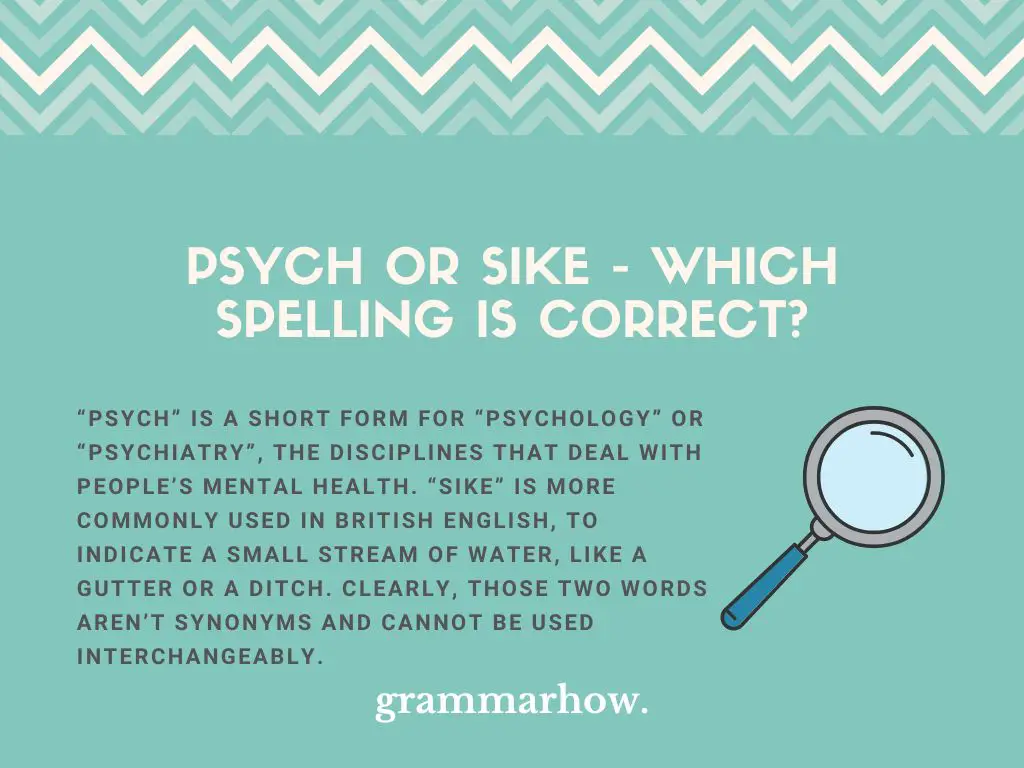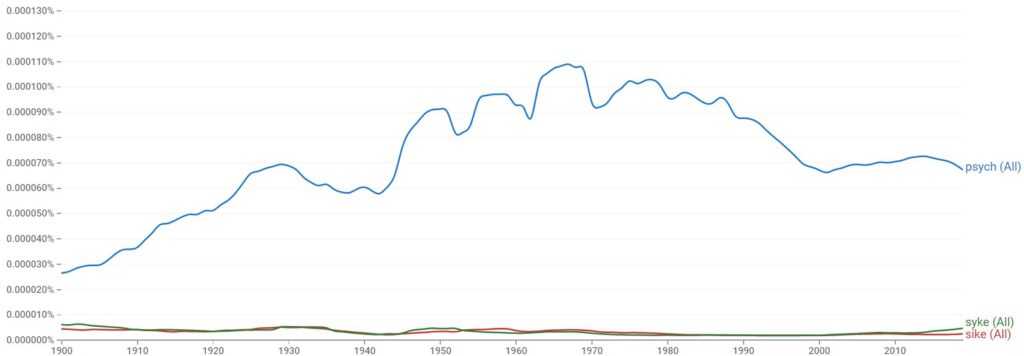“Psych” and “Sike” sound like synonyms, but aren’t. Actually, are both even words we can use and incorporate into our vocabularies? Do they make sense or have meaning?
Let’s look into both separately, to understand what each really means and how we’re supposed to use them in our communications.
Psych or Sike – Which Spelling Is Correct?
“Psych” is a short form for “Psychology” or “Psychiatry”, the disciplines that deal with people’s mental health. “Sike” is more commonly used in British English, to indicate a small stream of water, like a gutter or a ditch. Clearly, those two words aren’t synonyms and cannot be used interchangeably.

Take a look at the examples below:
- I took Psych in college, and found it very complicated.
- I took sike in college, and found it very complicated. (incorrect)
- There was a sike in our backyard, growing up.
- There was a psych in our backyard, growing up. (incorrect)
The first set of examples refers to someone who took “Psych” as a discipline while in college. That’s the correct sentence. Look at what happens to it, when we replace “Psych” for “”Sike”. The sentence loses its meaning, completely.
Same thing goes for the second set of examples. Someone’s describing a small stream of water in their backyard, a “Sike”. The moment you replace that word for “Psych”, the description loses meaning and the sentence doesn’t work anymore.
“Psych” and “Sike” aren’t synonyms.
Psych
“Psych” is the short form for “Psychology”, most of the time. It can also be the short form for “Psychiatry”, meaning you have to carefully read the context to understand exactly what the word means in the context it’s being used.
Figuratively speaking, “Psych” is sometimes used to indicate motivation and excitement, as well. The Cambridge Dictionary agrees with our definition and keeps it very concise, actually. Let’s then look at some examples:
- We had to psych ourselves up for the competition.
- After telling me the fake bad news, he just exclaimed, “psych!”.
- When I took Psych in college, I found it very interesting.
- The kid was psyched to meet his new puppy.
- When he told me he had met with his “Psych” earlier in the day and had a very good session.
“Psych”, as most short forms, is very casual and informal. You should use “Psych” for daily conversation with people you feel comfortable with.
However, in a formal setting that requires a more polished speech, use the full version of the word – or any full proper word that would make sense in addressing your audience.
Sike
“Sike” is a word that appears in British English, to describe a ditch or gutter, or even a small stream of water – so small that it could dry up in the hot months of the summer.
The Cambridge Dictionary doesn’t acknowledge “Sike” as a word in the English language, but a definition similar to the one above can be found in The Merriam-Webster Dictionary.
Take a look at some examples below:
- The sike in Josh’s garden is full of weeds.
- We should let the kid play in the sike, before it dries up for the summer.
- I’m thinking about naming the ranch after the sike that runs through it.
- Jean and I sat by the sike and talked about everything that happened.
- Andrew’s backyard with the sike and the trees is gorgeous.
Syke
“Syke” is just a misspelled version of “Sike”. It definitely isn’t a synonym for “Psych”, but it also doesn’t work as a replacement for “Sike”. It’s an incorrect form that should simply be avoided.
The Cambridge Dictionary doesn’t provide a description of this word, because it actually doesn’t exist. The Merriam-Webster Dictionary only refers the reader to the correct form, which is “Sike”.
Still, let’s look at some examples, including “Syke” being incorrectly used, followed by the corrected version of the sentence:
- I wish I had a syke in my backyard. (incorrect)
- I wish I had a sike in my backyard.
- I’m syked to be in this class. (incorrect)
- I’m psyched to be in this class.
- Peter placed a bench by the syke, so we could all enjoy the view. (incorrect)
- Peter placed a bench by the sike, so we could all enjoy the view.
Sentences 3 and 4 show an attempt to use “Syked” when the correct word would be “Psyched”. Clearly there’s no way those words would ever interchange.
In the other sentences, we interchanged “Sike” (correct) with “Syke” (incorrect), and that clearly doesn’t work well either. It’s just harder to notice, when you aren’t familiar with the correct spelling of the word.
Which Is Used the Most?
Of all three forms, “Psych”, “Sike” and “Syke”, which is used more often? We’ll take a look at the graph from Google Ngram Viewer below to find out.

“Psych” is used with much more frequency than “Sike” and “Syke”. That’s what we expected to see, first because of the meaning of “Psych”, but also due to the fact that “Sike” is used more in British English, which makes it a little too specific.
The surprise on the graph was to realize that, actually, “Syke” seems to be used more than “Sike”, even though the latter would be the correct form and the first would be the incorrect one.
Psych Out or Sike Out?
“Psych Out” means to intimidate an opponent, with the goal of obtaining some advantage in a competition. The idea is to get into their mind and throw them off their game. “Sike Out” is just a misspell of the correct expression and, consequently, you should avoid it.
Let’s take a look at some examples:
- Last race, Anthony tried to psych me out. It obviously didn’t work, because I won.
- Last race, Anthony tried to sike me out. It obviously didn’t work, because I won. (incorrect)
- We entered the field with mad faces, to psych out our opponents.
- We entered the field with mad faces, to sike out our opponents. (incorrect)

Martin holds a Master’s degree in Finance and International Business. He has six years of experience in professional communication with clients, executives, and colleagues. Furthermore, he has teaching experience from Aarhus University. Martin has been featured as an expert in communication and teaching on Forbes and Shopify. Read more about Martin here.

